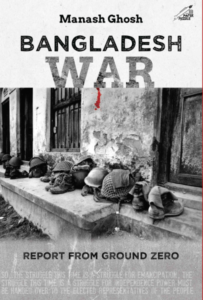Interview: Senior Journalist Manash Ghosh On His Book Bangladesh War: Report From Ground Zero


16th December marks the 50 years of the Liberation of Bangladesh. Senior journalist Manash Ghosh was one of the first war journalists to cover the Bangladesh Liberation War in 1971. His book Bangladesh War: Report from Ground Zero throws light on the political upheaval in the country and ultimately led to the formation of Bangladesh. The Kolkata Mail correspondent Priyanka Dutta caught up with the author in an exclusive chat. Excerpts..
As a war journalist, you have seen Muktijuddho very closely. How much has this experience helped you to write this book?
Manash Ghosh- The whole of it. After Bangladesh’s independence during my three-year posting in Dhaka as The Statesman’s bureau chief, I did in-depth investigations into many of my unanswered queries and they bore rich fruit for me. I had already made up my mind to write a book from the perspective of an Indian journalist and I did my homework very seriously. My knowledge of and access to the topmost Bangladesh leadership, both political and military, helped me to collect details about the behind the scene happenings during the nine-month-long liberation which were not known to me earlier. So those investigations helped me to plug the loopholes that were needed to construct and reconstruct my narrative of events.
You were a cub reporter when you first started reporting on the war. How did you prepare yourself to write about such an important event?
Manash Ghosh- Since I was just a mere cub reporter when I started covering the liberation war, the slight and humiliation that I suffered at the hands of my seniors made me adequately and properly equip myself for the war coverage. I took their snide remarks as a challenge and read up to three books on Pakistan’s polity and military including one by Ayub Khan. I religiously listened to BBC and VOA broadcasts in Bengali which provided extensive coverage on the evolving situation in East Pakistan. I also built contacts among former East Pakistan politicians settled in Calcutta who had kept themselves abreast of the developing scene in Pakistan’s eastern province. They provided such excellent insight that I could decode the complicated scene unfolding there.
Since you have had firsthand experience of the war, how difficult or easy was it to write the book? How did you decide which incidents to include in more detail than the others?
Manash Ghosh- My firsthand knowledge of the war and close interaction with its major and minor actors helped me immensely to write this book without confusion. I did not have to do months and months of field research or read reams and reams of archival materials to write this book. It came straight from my memory and the notes that I had preserved for writing this book. They came in handy. I had to be very selective in choosing what all to write about and what all to leave out. I did not want my book to be cluttered with incidents that would hamper the free flow of easy reading. I selected only the major ones which had a direct bearing on the conduct of the war.
How much time did it take to write this book?
Manash Ghosh– Five months.
You had good terms with the sector commanders of Mukti Bahini. How many of those experiences have you shared in this book?
Manash Ghosh- A lot. My book is replete with their references which make my book written by an Indian journalist unique and special. There were sector and sub-sector commanders who sought and got Indian help for waging the liberation war and there were others who had strong reservations against taking Indian help. I have mentioned both types in my book at length. This sets my book apart from others of its genre.
This is the 50th anniversary of Bangladesh’s Liberation War and the book was released this year. How elated are you about the timing of the book release?
Manash Ghosh- Actually I planned its publication to mark the golden jubilee celebrations of Bangladesh’s founding. I am very happy about it as this is my humble contribution to that country’s liberation struggle. I saw from the beginning till the end the various phases of birth pangs of a nation. I saw history being created in front of me and I have tried to truthfully record it in my book for posterity I consider myself very lucky for having done that with honesty.
You have a huge experience in war reporting. Can you share some tips for new war journalists on the do’s and dont’s of a war journalist?
Manash Ghosh- Firstly a war journalist has to be very clear in his mind whether his journalistic coverage of the war in terms of news and views is for the right cause. If the cause is right, which it was in the case of Bangladesh’s liberation struggle, he should go the whole hog irrespective of the risks involved. But one should not be too adventurous or foolhardy in doing things that are patently risky and dangerous.
